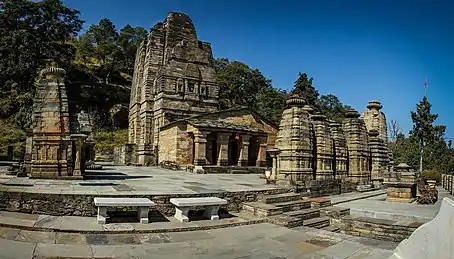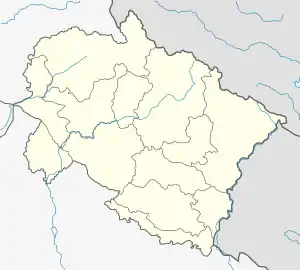Katarmal
Katarmal is a remote village located in Kumaon Division, in Almora District, Uttarakhand, India.

Katarmal | |
|---|---|
Village | |
 Sun Temple, Katarmal | |
 Katarmal Location in Uttarakhand, India  Katarmal Katarmal (India) | |
| Coordinates: 29.632473°N 79.614682°E | |
| Country | |
| State | Uttarakhand |
| Elevation | 2,116 m (6,942 ft) |
| Languages | |
| • Official | Hindi |
| Time zone | UTC+5:30 (IST) |
| Vehicle registration | UK-01 |
| Climate | Alpine (BSh) and Humid subtropical(Bsh) (Köppen) |
| Website | uk |
Location
Katarmal is located at a distance of 1.5 km from Kosi village and 12 km from the district centre, Almora[1] and 70 km from Nainital.[2] Located at a height of 2116 meters above sea level, it is well connected by road, 30 km away from Khairna, Garampani (Nainital, Haldwani, Coordinates: 29°29'39"N 79°28'46"E) & 17 km from Ranikhet and Kausani the nearest connecting point being near Kosi village.[1] The G.B. Pant Institute of Himalayan Environment and Development, established in 1988 serves as a nodal agency for research and development and was established here by Government of India.[3]
Surya temple
Katarmal is known for a relatively rare Surya temple, constructed by the Katyuri Kings in the 9th century CE.[1] Katarmalla, a Katyuri king constructed this temple, which has 44 smaller temples around the main deity of Surya, which called as Burhadita or Vraddhaditya.[2] Other deities like Shiva-Parvathi and Lakshmi-Narayana. are also established in this temple complex. The carved wooden doors and panels were transported to the National Museum, Delhi, after an idol from the 10th century was stolen.[1] The temple, which holds other carvings on walls and panels, was declared a monument of national importance under the Ancient Monuments and Archaeological Sites and Remains Act of 1958.[1]
References
- Sajwan, Venita (17 August 2002). "A lesser-known sun temple at Katarmal". The Tribune. Retrieved 8 July 2013.
- "Katarmal Sun temple,Almora". Nainital Tourism. Retrieved 9 July 2013.
- "G. B. Pant Institute of Himalayan Environment and Development". G. B. Pant Institute of Himalayan Environment and Development. Archived from the original on 26 July 2013. Retrieved 20 July 2013.